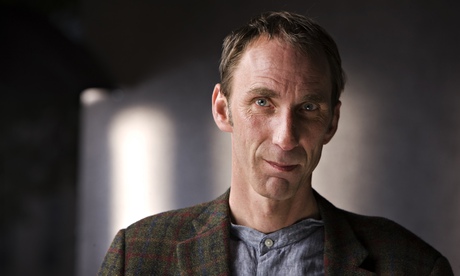
Readers of Will Self's Booker-shortlisted novel Umbrella will, at least to some extent, know where they are when plunged into the choppy waters of Shark. This is a sort of sequel/prequel. Its protagonist is again the anti-psychiatrist Zack Busner. Its method, too, is the same: here is a book-length paragraph, beginning and ending mid-sentence, peopled by a cast several dozen strong, and narrated in a fugal stream-of-consciousness that shifts abruptly between time frames and consciousnesses. So: the waters are again choppy. But they are also distinctly navigable. You can usually tell what's happening, and the effect of the rush of language is to push the reader on rather than away.
In the 1940s, Peter (aka "Kins", for Peterkins) De'Ath and his brother Michael both register as conscientious objectors in the second world war. Peter – who carries the shame of his cowardice lifelong – is accepted, and spends the war digging beets in a Community Land Association commune in Lincolnshire. Michael's application is refused: he flies bombers and eventually acts as the RAF's observer on the Hiroshima mission.
In the 1970s, Zack Busner – having decided RD Laing didn't go far enough – is running an experimental community for the mentally different in a linked pair of houses in Willesden. Among his charges is Claude, known as The Creep, who babbles and scats incessantly and who – if not intercepted in time – will tend to grab the post from the doormat and start scoring out great sections of it with a felt-tip pen. This is a reprisal of his role as a military censor. Claude was with the US army air corps, helped prepare the Enola Gay for her mission and was on the USS Indianapolis when it went down – pitching its crew into the shark-infested waters of the South Pacific.
Another thread concerns Jeanie – the daughter of an abusive and alcoholic (but Guardian-reading) Mumsie, who herself goes on to a young womanhood (as Genie) of drug addiction and prostitution. She links in, a bit tenuously, because Mumsie had a long casual relationship with Kins, and she will later work in the care home to which a senile Claude is confined. But her story gives the book much of its emotional heft.
The central scene – though it is recapitulated in flashback as Zack Busner, five years later, sits in the cinema with his son – concerns a disastrous afternoon in which several residents of Concept House are knowingly or otherwise dosed with acid. Everyone loses his shit except, oddly, Claude, who becomes sane – just in time to have a long conversation with Michael, who pays an unexpected visit to Concept House to look in on another resident. Through this framework surges a watery torrent of war, death, madness and 20th-century horror – along with more ground-level preoccupations such as hunger, addiction, gestation, parenthood and anxiety about teeth. Also there's some shrewd film criticism about Jaws.
Self shares JG Ballard's interest in the psychopathology of everyday life, and in the insistent strange juxtapositions between apparently discrete things. But where Ballard most often works at the level of symbol and image, and is almost militantly uninterested in the inner lives of his characters, Self's rhymes and correlations bubble in the language itself, and his whole method is concerned with inwardness. Every pun is a Fraudian slip; and it is with feeling that he'll describe Jeanie in girlhood weeping behind a bus shelter as she crams penny chews into her mouth. It makes him a warmer writer than Ballard, and – despite the superficial difficulties of his form – a less profoundly strange one.
The narration does raise questions about the status of the voice, though: we are clearly in Zack's head, or in Jeanie/Genie's, or in Claude's, or in Michael's, or in Kins's at any given time – but preoccupations and tropes and images are shared. Both Michael and Claude, for instance, have visions of what they call "skin angels" – the flying bodies of the burned-and-flayed-to-death. The effect is something like a collective hallucination, a blurring of identity: the characters are gathered up into a narrative Gestalt. At one point Busner wonders, aptly: "Is the associative faculty merely a matter of neurons randomly zapping together, so that… electrics sparks shocking? Or is this activated by… latent psychic content?"
This does all play to Self's tendency to chuck in the kitchen sink. If something can be made to correlate, it will: the trivial correspondence and the profound bob side by side in the linguistic flotsam. But that is, perhaps, what you'd expect from a stream-of-consciousness treatment that is, at various times, steeped in alcohol, heroin, amphetamines and LSD. This is the province of chance and confusion, serendipity, odd tricks of perspective and, above all, circularity. The ouroboros, or snake eating its tail, gets its traditional Selfian namecheck. Things and people, like sharks, are perpetually circling "round annaround". The half-sentences on which it begins and ends link.
I should add that, amid patches of superb writing (Self can muster grandeur for the blossoming of a mushroom cloud, horror-comedy for the sharks' feeding frenzy, mnemonic exactness for the furniture of a 1970s squat) there's room for at least one winningly cheap joke. Busner, tripping balls, gets the horrors at Claude's "yellow teeth bared" but is even more freaked out by the soothing classical music in the background: "the Bach… worse than any bite!" Since you have to get 339 pages in to reach that joke, it technically qualifies as a sharky dog story.
Shark is published by Viking (£18.99). Click here to buy it for £14.19 with free UK p&p

